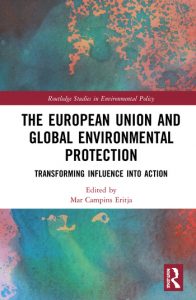
This book examines how the EU can be a more proactive actor in the promotion of the principles of sustainability and fairness from a legal environmental perspective. The book is one of the results of the research activity of the Jean Monnet Chair in EU Environmental Law (2017-2020) funded by the European Commission under the Erasmus+ programme.
The European Union and Global Environmental Protection: Transforming Influence into Action begins with an introduction of the key EU competences, instruments and mechanisms, as well as the current international challenges at the EU level. It then explores case study examples from four regulated fields: climate change, biodiversity, multilateral trade, unregulated fishing, and access to justice; and four unregulated areas: mainstreaming of the Sustainable Development Goals in EU policies, and environmental justice, highlighting the extent to which the EU might align with international environmental regimes or extend its normative power.
This volume will be of great relevance to students, scholars, and EU policy makers with an interest in international environmental law and policy.
Table of contents
Chapter 1.: Introduction
Mar Campins Eritja, University of Barcelona
Chapter 2: Climate change: Some Challenges for Enhancing the EU’s International Influence
Mar Campins Eritja, University of Barcelona
- Introductory remarks
- The shared exercise of EU competences.
- A comprehensive and integrated approach to fight climate change.
- The United States withdrawal from the Paris Agreement and the EU stronger alliance with China
- The Brexit and its impact on the EU climate policy
- Final remarks
List of references
Chapter 3: The EU Diplomacy for Biodiversity and the Future EU Biodiversity Strategy
Teresa Fajardo del Castillo, University of Granada
- Introductory remarks
- A EU competence and a legal mandate to protect biodiversity globally
- Is there a specific EU diplomacy for biodiversity?
- Recommendations for the EU 2030 Biodiversity Strategy: Aligning its objectives with those of Green Multilateralism
- Final remarks
List of references
Chapter 4: The Role of the EU in the Promotion of Sustainable Development through Multilateral Trade
Xavier Fernández Pons, University of Barcelona
- Introductory remarks
- The EU’s Generalised Scheme of Preferences (GSP) and its special incentive arrangement for sustainable development and good governance (GSP+)
- The inclusion of a chapter on sustainable development in the new regional trade agreements (RTAs) concluded by the EU with third countries
- The EU and sustainable public procurement
- The recent reform of the EU regulation of anti-dumping measures and the issue of so-called social and ecological dumping
- EU’s trade measures related to carbon footprint
- Final remarks
List of references
Chapter 5: The EU’s Global Leadership in the Fight against Illegal, Unreported and Unregulated Fishing
Xavier Pons Rafols, University of Barcelona
- Introductory remarks.
- The global phenomenon of IUU fishing.
- International legal concept of IUU fishing.
- Basis and scope of the EU regulations on IUU fishing.
- Core content of the EU regulations on IUU fishing.
- The international effect of EU action: establishment of a list of non-cooperating third countries.
- The multilateral influence of EU action: The Port State Measures Agreement and other international legal and institutional frameworks to combat IUU fishing.
- Final remarks
List of references
Chapter 6: The International Dimension of the EU on Access to Justice in Environmental Matters
Alex Peñalver i Cabré, University of Barcelona
- Introductory remarks
- The role of the EU in strengthening access to justice in environmental matters under International Law
- The EU’s inadequate implementation of the Aarhus Convention on access to justice in environmental matters
- The Aarhus Convention Compliance Committee case ACCC/C/2008/32 and the shortcomings in access to justice in environmental matters at EU level
- EU response to the Meeting of the Parties of Aarhus Convention in case ACCC/C/2008/32
- Final remarks
List of references
Chapter 7: Environmental Refugees: Reshaping the Borders of Migration in the EU
Susana Borràs Pentinat, Rovira i Virgili University
- Introductory remarks
- People moving in the context of environmental change
- Environmental refugees: the forgotten migrants in the EU migration policy
- Towards the recognition of the environmental refugees at the EU level?
- Mind the gap: defending and protecting environmental refugees at the EU level
Final remarks
List of references
Chapter 8: Environmental Crime: Assessing and Enhancing EU Compliance with International Environmental Law
Maria Marques Banque, Rovira i Virgili University
- Introductory remarks.
- Multilateral Environmental Agreements (MEAs), EU Law and criminal sanctions.
- The Directive 2008/99/EC on the protection of the environment through criminal law
- The protection of the environment through criminallLaw in the EU beyond the Directives 2008/99/EC and 2009/123/EC.
- A proposal to enable the EU to reinforce its position within the international environmental regime.
- Final remarks
List of references
Chapter 9: Mainstreaming Sustainable Development Goals into EU Policies
Mar Aguilera Vaqués, University of Barcelona
- Introductory remarks
- From the concept of sustainable development to Sustainable Development Goals
- Sustainable Development Goals as an EU political effort
- The EU as a global trailblazer in sustainable development
- From mainstreaming Sustainable Development Goals to the 2019 European Green Deal.
- Final remarks
List of references
Chapter 10: Environmental Justice in EU Law and Policies: A Fundamental Challenge
Jordi Jaria Manzano, Rovira i Virgili University
- Introductory remarks
- Environmental justice vs sustainable development: conceptual considerations about the interpretation of the global environmental crisis
- Environmental justice and fundamental EU values
- EU law, EU policies and environmental justice: vulnerability, conflicts and change
- Final Remarks
